Here’s an interesting headline from Reuters: “Consumer groups join conservatives against AT&T deal for Time Warner.”
We can note immediately the strange-bedfellows alliance here. Self-described “consumer groups” tend to be on the left, and yet conservatives—including such well-known groups as Tea Party Patriots and the American Family Association—have joined with them to oppose the AT&T-Time Warner deal.
Strange Bedfellows, Right and Left: What Do They See in Each Other?
In a letter to the Justice Department, which is currently examining the antitrust implications of the case, the combined groups declared.
While the undersigned groups’ opinions diverge significantly on many policy issues, we are united in our desire to ensure that free expression is not threatened by an increasingly limited number of companies that dominate U.S. media.
In fact, the proposed deal has been controversial since it was announced last fall; on October 22, 2016, Donald Trump pledged to block it:
As an example of the power structure I’m fighting, AT&T is buying Time Warner and thus CNN, a deal we will not approve in my administration because it’s too much concentration of power in the hands of too few.
So what’s going on here? Why have activists on the right and left joined together to oppose this merger? After all, there have been plenty of big mergers in the last few decades, most of which have attracted little controversy. So what is it about this particular deal?
‘Public Interest, Convenience, Necessity’
The most obvious distinguishing feature of the AT&T-Time Warner deal is that it involves two industries that historically have been closely regulated—that is, telephones and radio/television. And meanwhile, these two high-profile industries have long since converged into the single category of “telecommunications.”
Yet, for all the changes, the original logic of regulation for both industries still has a firm grip on the public mind: People believe there should be checks and balances.
The telephone industry has been regulated since AT&T reached an out-of-court settlement with the Justice Department in 1913—the so-called Kingsbury Commitment. In the century since, regulation has surged and subsided, but there’s never been a time when the public hasn’t been wary of the power of Big Telco.
Regulation of the radio/television industry took a little longer to start up. In the ’10s and ’20s, as radio became popular, anyone with a radio transmitter could become a radio-broadcaster; the result was chaos on the airwaves, with one signal crashing into another. In 1927, Congress responded by passing the Radio Act, which was soon followed by the Communications Act of 1934, which created the Federal Communications Commission (FCC).
A key feature of the new regulatory apparatus was that a broadcaster needed a license from the FCC to operate a specific station. These licenses were free but limited; the guiding doctrine was that they would be distributed to broadcasters after the FCC made a determination as to the impact of a license on the “public interest, convenience, and necessity.”
We can quickly see that these broadcast licenses became both valuable and political. That is, valuable because they were scarce, and political because they were being doled out according to political criteria—or, should we say, regulatory criteria with a highly political tinge.
Some might call this allocation system “crony capitalism,” and perhaps it was. Yet it’s hard to see what other system would have been better; for instance, if the FCC had auctioned off licenses to the highest bidder, it’s easy to see that big corporations and investors would have snapped them all up.
So, we can see, the highest-bidder system, which rewards wealth, cuts against the obvious non-monetary value of seeing local media in the hands of local figures.
Localism: The Power of Place?
By the order of Congress, one of the tests that the FCC used to determine the “public interest” in broadcast licensing was the idea of localism. After all, one of the great fears as regulation got started was that New York City would end up controlling the national airwaves. Champions of localism also warned against letting happen here what was happening in other countries; we don’t want a monopolistically condescending BBC here in the U.S., the localists said, to say nothing of a Radio Moscow.
We can pause to note that this idea of distributing political power across the states has deep roots in our history. The Constitution was, in fact, written to privilege the power of little states; that’s why we have the Electoral College and the system of two U.S. Senators per state, no matter the size of the state. In fact, per the math of presidential politics, a voter in one of smallest states has twice the power of a voter in the largest states.
Other aspects, too, of federal governance pointed toward the same distributivist ideal. For example, when the Federal Reserve System was established in 1913, the easiest thing would have been just to set up a central bank in the financial capital, New York City, and let it monitor American banking from there. Instead, President Woodrow Wilson worked with Congress to create a system of 12 Federal Reserve Districts, thereby counteracting the centralizing tendency of a central bank.
In that same spirit, the FCC wove localism into the tapestry of its regulatory structure. For instance, in 1939, the commission enacted a “main studio rule,” which required broadcast-license-holders to maintain a studio within 25 miles of the communities to which they were operating. The logic was obvious: If a licensee was going truly to serve the public interest, convenience, and necessity in a given area, then it had to be in that given area.
Yet in recent decades, the FCC’s concern for localism has waned greatly. Part of this change was because of technology; it has become ever easier for station-owners to automate their operations, so why have a bigger payroll than they need? And why not lobby the FCC to give way on the old rules?
Still, the bigger part of the change has been caused by shifting political and intellectual currents; the tendency over the last few decades has been to look for ways to deregulate. To be sure, deregulation sounds good, but one must always think about the consequences that follow.
Since 1994, for example, the FCC has been doing what it specifically chose not to do in the old days—it’s been auctioning off licenses for spectrum. That is, the doctrine of “public interest” has been changed to “biggest checkbook.” And so today, localism has been gut-punched; big investors now own all the new licenses.
This deregulatory wave—some call it “libertarian,” others call it “neoliberal”—has manifested itself in other ways, too. For instance, the de-emphasis on localism has meant fewer employees in locales, as well as even more absentee management. Lately, it’s meant that the “program director” for a station could be nothing more than an algorithm ciphering away in a computer somewhere in a bunker.
Indeed, a look at the FCC’s website shows that its formal localism proceedings have gone completely silent since 2008. Moreover, just on October 24, the FCC voted to terminate completely its 78-year-old “main studio rule.” So the remaining human beings who work at local stations might wish to start polishing their resumes, as their jobs are likely now on some CFO’s chopping block.
Of course, we still occasionally get reminders that the FCC has a licensing function: On October 11, President Trump tweeted this shot at TV news:
Network news has become so partisan, distorted and fake that licenses must be challenged and, if appropriate, revoked. Not fair to public! [emphasis added]
A challenge to a broadcast license involves a formal legal proceeding at the FCC. Such challenges are extremely rare, and successful challenges are even rarer. And of course, license-challenges apply only to broadcasters such as, say, NBC. The entire cable-TV industry, including Trump’s arch-nemesis, CNN, is not licensed by the FCC, and thus it’s immune from this sort of challenge.
Most Americans, of course, probably don’t understand the distinction between a broadcaster and a cabler; to them, TV is just TV. And in fact, the technology of the various delivery systems—cable, satellite, Internet—is now so complicatedly interchangeable that almost nobody understands it.
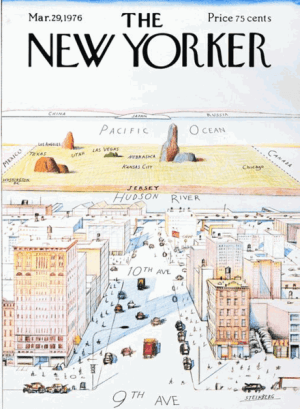
The famous March 29, 1976 cover of The New Yorker showing “View of the World from Ninth Avenue” by Saul Steinberg
The completely predictable result of these regulatory and technological trends is that today we have exactly the sort of media concentration that the lawmakers of eight or nine decades ago feared so intensely. That is, we are seeing an inordinate clustering of media in New York City and a couple other coastal hubs, even as local media in Anytown has been hollowed out.
So we might step back and ask: Is the media better today without that local voice? Should Heartland Americans be okay with getting most of their news from just one place? Especially if it’s a place with a monolithically liberal viewpoint?
We might think on that famous cover cartoon in a 1976 issue of The New Yorker magazine, the one depicting a thriving Manhattan and beyond that, the rest of the country empty, except for some rocks—you know, the cover that New Yorkers loved so much. But are folks everywhere else fine with the realization that they being regarded as anonymous yokels in a wasteland?
Or, as an alternative scenario, would Heartlanders decide that they are better off if the broadcast networks, and the Main Stream Media overall, had to pay attention to them, and to their concerns? That is, after all, the basic argument of the anti-AT&T-Time Warner protestors, right and left—and they have a point.
And it’s CNN that really clinches their argument.
The MSM Tramples Localism?
CNN has its roots in the ambitious vision of Ted Turner. Back in the ’60s, the Atlanta-based mogul built an empire of outdoor advertising across the Southeast. Later in the ’60s, he branched into buying radio stations and, from there, to TV.
Then in 1978, Turner used the emerging technology of satellites to launch WTBS, a self-proclaimed “superstation,” which brought him a truly nationwide reach. All of a sudden, Americans everywhere could watch, for example, Atlanta Braves baseball games.
Here we can pause to observe that while WTBS was formally non-political, what we might call the meta-politics of WTBS were, in fact, profound. That is, all of a sudden, networks could proliferate, mostly without regard for the strictures of the increasingly asleep-at-the-switch FCC. And as we have seen, in the name of deregulation, the FCC was making less and less of an effort to enforce localism guidelines—or any kind of guidelines.
In this meta-political reckoning, the mere fact that WTBS could penetrate local markets without any concern for local attitudes was, in and of itself, a kind of politics. Thus the meta-politics of Big Money, Big Culture, and Big Technology, all combined to roll over local perspectives and local concerns.
Then, in 1980, came an even more fateful development, building on the success of TBS: Turner launched CNN. That network, of course, was overtly political—it was all about politics.
To be sure, in its early years, CNN was a bit to the right of the other big TV outlets; it was, after all, based in Atlanta, and the world looks different from down South. (Just as does from out West, or up North—that’s the value of localism, it adds perspective.)
And yet all that changed in 1996, when Turner was bought out by Time Warner; soon CNN became just another cookie-cutter Manhattan media portal. Yes, CNN has reporters and bureaus around the country, but nobody thinks that its editorial voice is anything other than that of 10 Columbus Circle on the Upper West Side. You know, where CNN chief Jeff Zucker holds his court, and from which the likes of Anderson Cooper issue their daily pronouncements to the proles and peons out there, somewhere west of the Hudson River.
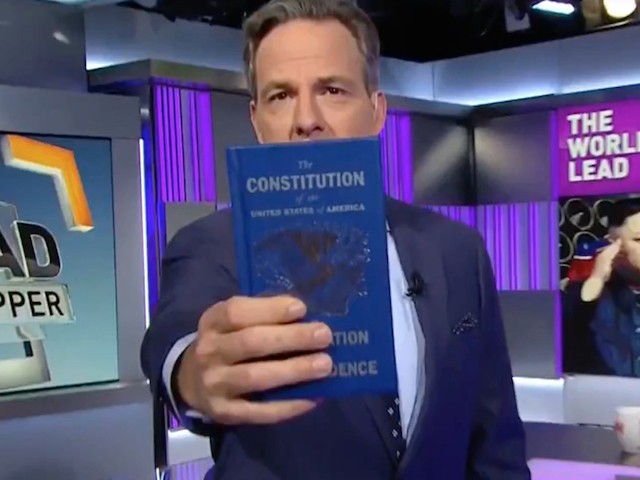
CNN’s “The Lead” host Jake Tapper holds up a pocket U.S. Constitution in response to President Trump’s media criticism. (Screenshot)
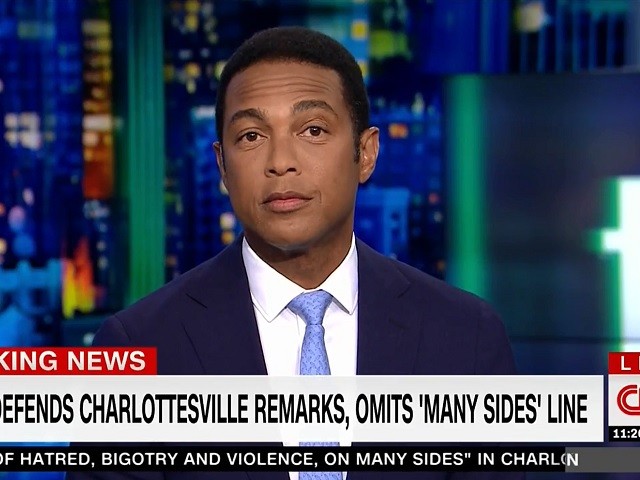
CNN host Don Lemon responds to President Trump’s remarks on the violence in Charlottesville, VA, calling him “unhinged,” “without reason,” “devoid of facts.” (Screenshot)
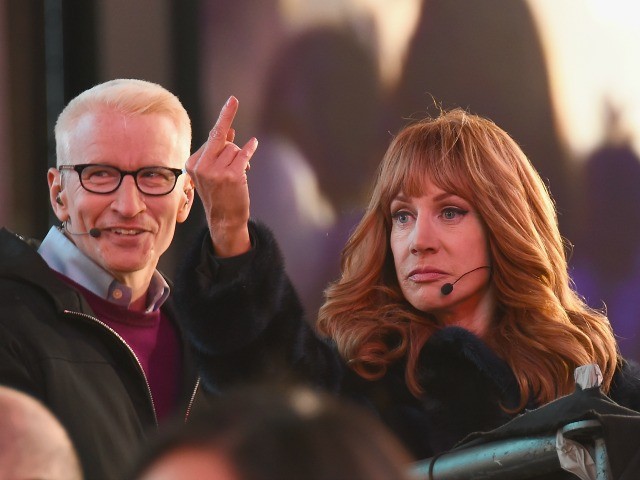
CNN’s Anderson Cooper and Kathy Griffin host the cable network’s New Year’s Eve coverage, December 31, 2015, in New York City.
Some have wondered just what AT&T might do if the deal closes. Some have suggested that AT&T might wish to spin off CNN, while keeping other Time Warner assets, such as HBO. And it’s also been suggested that AT&T might seek to somehow rein in CNN, perhaps by letting go of Zucker. Anything’s possible, but just on October 29, AT&T issued a statement that seemingly expresses its strong commitment to CNN and Zucker:
We don’t comment upon anyone’s employment at a company we don’t yet own. But, as it relates to CNN, it’s clearly a great organization, they are having a great year, and Jeff Zucker is doing a terrific job.
Digital Tramples Cable, the MSM, and Localism—But Localism Is Fighting Back
Today, just two digital companies—Alphabet (Google) and Facebook—have formed a duopoly; they now take in more than 60 percent of all the advertising in America. This duopolistic control has siphoned away money from every other media sector, including television (Those two Silicon Valley companies, of course, are notorious for their liberal politics and algorithm-based biases—but that’s a tale for another time.).
In the meantime, as “Googlebook” grows, the cable-TV carriers are losing customers due to widespread cord-cutting. Indeed, more Americans now subscribe to another Silicon Valley giant, Netflix, than to cable TV.
So by this reckoning, perhaps we shouldn’t worry so much about the AT&T-Time Warner deal; after all, it’s focused on two shrinking markets, cable and TV.
However, the fact is that Americans, starting with President Trump, do worry. A lot.
Yes, the MSM may be less powerful than it once was, but it’s still plenty powerful. So the activists are drawing a line in the sand. We have been pushed too far, they are saying, and we will be pushed no further—and so the fight starts here.
So sure, it could be argued that the activists should pick another target, most obviously, Googlebook. And perhaps in the future, they will. But for now, the fight is against AT&T-Time Warner.
This new spate of concern over media giantism helps explain why the wrangling over the acquisition has dragged on; interestingly, when the deal was first announced, the phone colossus gave itself a year to close said deal. And yet just a few days ago, that expiration date came and went. AT&T now says it will use an undefined “short period” to keep working toward the hoped-for closure.
It’s hard to know whether the anti-deal activists will succeed in their blocking mission. Yes, the President has opposed the deal in the past, but he hasn’t said anything about it lately—although he does continue to hammer CNN.
Yet in that joint letter of opposition, the one to the Justice Department, we see the seeds of something new—a new spirit of populism that could unite right and left, at least on some issues. And such populist unity is possible because, yes, locals actually care about localism.
The elites might see localism as just a bump in the road on the path to greater conformity and profitability. And of course, for many in the elite, the true goal is something even grander—namely, profitable globalism.
So the elites, pushing their agenda, as well as, of course, an increase in their bottom line, aren’t about to give up. And for their part, we can say that people, too, aren’t about to quit. The folks are now alert to the need to defend their way of life against top-down pulverization, and they’ll soon enough start demanding that their elected officials start protecting them from the next big-money onslaught.
So today, the fight is over the AT&T-Time Warner matchup. Yet whatever the outcome in this case, it’s a cinch that the fighting will continue, far beyond any one corporate deal.
We can see: Just as they did in the ’20s and ’30s, the locals have woken up to discover the value of localism. And that waking spells trouble for the Manhattan-based corporatists, no matter how much of cash-advantage they have.
Because if the voters truly wake up, and stay awake, they will discover the true reality of democracy: The votes of the many matter more than the money of the few.
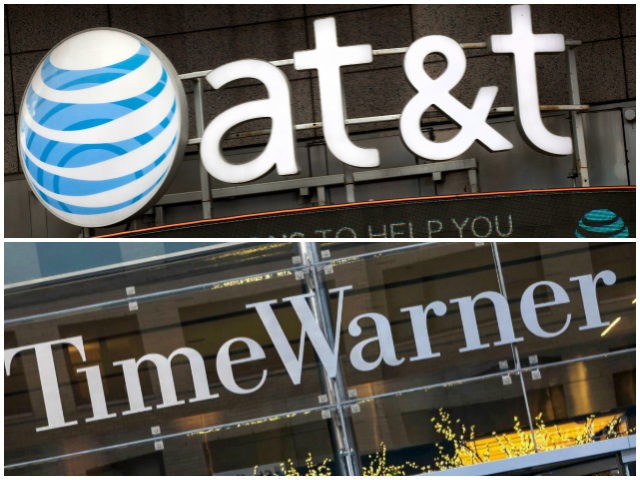
COMMENTS
Please let us know if you're having issues with commenting.